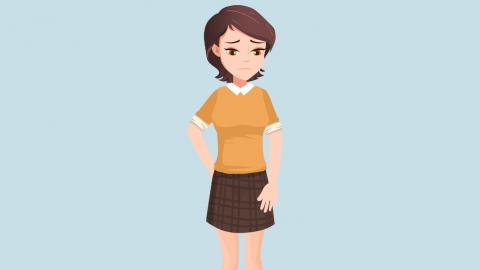What could be causing a dull pain inside the left buttock while walking?
Generally, the main causes of dull pain inside the left buttock when walking include overexertion, poor posture, piriformis syndrome, lumbar disc herniation, and hip joint synovitis. If discomfort occurs, it is recommended to seek timely medical evaluation and treatment at a正规 hospital. Specific analyses are as follows:
1. Overexertion
Excessive exercise of the left buttock muscles or prolonged walking recently can keep the muscles in a constant state of tension. Accumulation of lactic acid may stimulate nerves and cause dull pain. Reducing physical activity, avoiding long-distance walking, applying warm compresses with warm water to the buttock muscles, and performing appropriate massage to relax the muscles can help promote lactic acid metabolism.

2. Poor Posture
Long-term unilateral sitting, slouching, or shifting body weight to one side while walking can lead to uneven stress on the left buttock muscles, resulting in muscle strain and pain. Correcting sitting and walking postures, avoiding prolonged sitting on one side, standing up and moving every hour, and choosing chairs with moderate firmness can help reduce pressure on the buttock muscles.
3. Piriformis Syndrome
The piriformis muscle may become swollen and spastic due to injury or strain, compressing the sciatic nerve that passes through it. Muscle traction during walking can worsen this compression, causing buttock pain. Under medical guidance, medications such as celecoxib capsules, eperisone hydrochloride tablets, and mecobalamin tablets may be taken, along with physical therapy for the buttocks, while avoiding strenuous exercise.
4. Lumbar Disc Herniation
A herniated lumbar disc may compress the left nerve root, disrupting nerve conduction and causing radiating pain in the buttock. The pain becomes more pronounced during walking due to increased load on the lumbar spine. Under medical supervision, medications such as diclofenac sodium sustained-release tablets, vitamin B12 tablets, and tizanidine hydrochloride tablets may be used. In severe cases, percutaneous endoscopic discectomy may be required.
5. Hip Joint Synovitis
Inflammation of the synovial membrane in the hip joint caused by trauma or infection leads to congestion and swelling of the synovium. Movement of the hip joint during walking causes friction against the inflamed synovium, resulting in deep pain in the buttock area. Under medical guidance, medications such as etoricoxib tablets, synovitis granules, and cefuroxime axetil tablets may be prescribed. During acute phases, bed rest is necessary, and weight-bearing activities on the hip joint should be avoided.
In daily life, it's important to control exercise intensity and avoid excessive fatigue; maintain proper sitting and walking postures to reduce muscle strain; regularly perform exercises to strengthen back,腰部, and buttock muscles; and promptly rest when pain occurs to prevent worsening of the condition.




